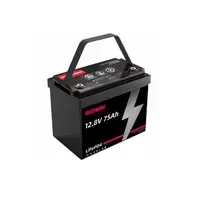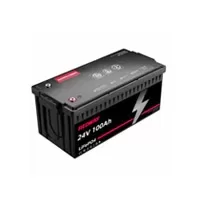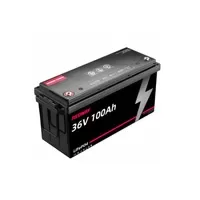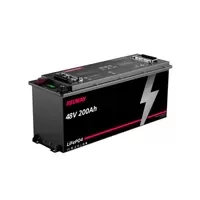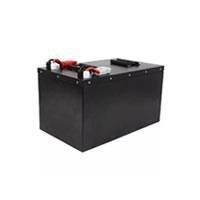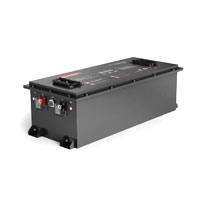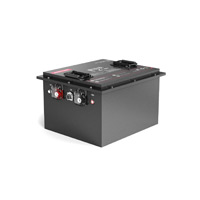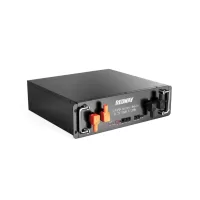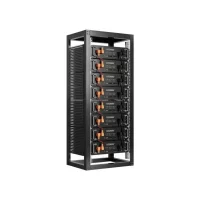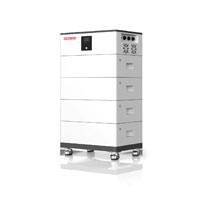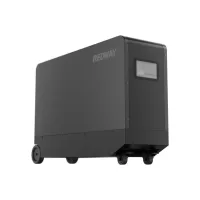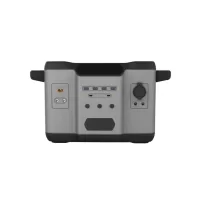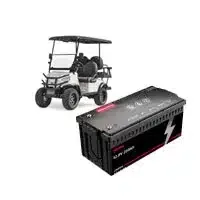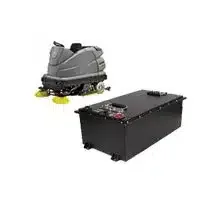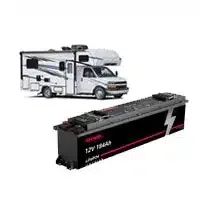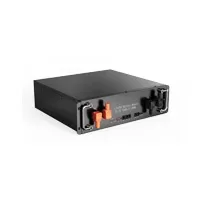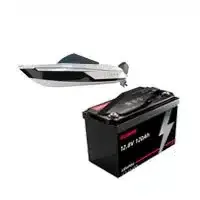Welcome to the world of RV travel, where adventure awaits at every turn! Whether you’re a seasoned road warrior or just starting your journey on the open road, one thing is for certain – having reliable power is essential. That’s why many RV enthusiasts are turning to lithium batteries as their go-to power source. These high-tech wonders have revolutionized the way we power our vehicles and offer a host of benefits that traditional batteries simply can’t match. But how long can you expect these cutting-edge powerhouses to last? In this blog post, we’ll dive into the fascinating world of RV lithium batteries and explore everything from their lifespan to tips for extending it. So buckle up and get ready to supercharge your adventures with RV lithium batteries!
Benefits of Using RV Lithium Batteries
Benefits of Using RV Lithium Batteries
1. Longer Lifespan: One of the key advantages of using RV lithium batteries is their longer lifespan compared to traditional lead-acid batteries. While lead-acid batteries may last around 2-5 years, lithium batteries can endure up to 10-15 years, providing a longer-lasting power source for your RV adventures.
2. Lightweight and Compact: Another benefit of lithium batteries is their lightweight and compact design. These batteries are significantly lighter than lead-acid counterparts, making them ideal for RV owners looking to reduce weight and improve fuel efficiency. Their compact size also allows for easier installation in tight spaces within the vehicle.
3. Faster Charging and High Discharge Rate: Lithium batteries have a higher charge acceptance rate, which means they can be charged at a faster rate compared to other battery types. Additionally, they offer a high discharge rate, allowing you to draw more power from the battery when needed without compromising its performance.
4. Efficient Energy Storage: Lithium batteries are known for their high energy density, meaning they can store more energy in less space compared to other battery technologies. This efficient energy storage enables you to power various appliances and devices on your RV without worrying about running out of juice quickly.
5. Maintenance-Free Operation: Unlike lead-acid batteries that require regular maintenance such as checking water levels and cleaning terminals, lithium batteries are virtually maintenance-free. With no need for frequent upkeep tasks or monitoring, you can spend less time attending to your battery needs and more time enjoying your travels.
In summary…
The benefits of using RV lithium batteries include their longer lifespan, lightweight design, faster charging capabilities, high discharge rates, efficient energy storage capacity,and maintenance-free operation.
These features make them an excellent choice for RV owners looking for reliable power sources during their outdoor adventures
Factors that Affect the Lifespan of RV Lithium Batteries
Factors that Affect the Lifespan of RV Lithium Batteries
There are several factors that can impact the lifespan of your RV lithium batteries. First and foremost, proper maintenance is crucial. Regularly checking the battery voltage levels and ensuring they are within the recommended range will help prolong their lifespan.
Another important factor is temperature. Extreme temperatures can have a significant effect on battery performance and longevity. It’s essential to keep your batteries in a climate-controlled environment whenever possible, especially during hot summer months or freezing winters.
The charging process also plays a role in battery life. Overcharging or undercharging can lead to premature deterioration. Investing in a quality charger with smart charging capabilities will ensure that your batteries receive the optimal charge without overtaxing them.
Usage patterns also impact how long your lithium batteries will last. Consistently discharging them to low levels before recharging can reduce their overall lifespan. Avoid deep cycling whenever possible and try to maintain an average state-of-charge between 20% and 80%.
It’s worth mentioning that the brand and quality of lithium batteries you choose for your RV matters too. Opting for reputable brands known for their durability and reliability will likely result in longer-lasting batteries.
By considering these various factors and implementing good practices such as regular maintenance, appropriate charging techniques, moderate usage patterns, and selecting high-quality products, you can maximize the lifespan of your RV lithium batteries
How Long Can You Expect Your RV Lithium Batteries to Last?
One of the biggest advantages of RV lithium batteries is their impressive lifespan. Unlike traditional lead-acid batteries that may need to be replaced every few years, lithium batteries can last significantly longer.
The longevity of your RV lithium batteries depends on several factors. First and foremost, it’s important to consider how often you use your RV and how much power you consume during each trip. If you frequently go on long journeys and rely heavily on electrical appliances, your battery will naturally have a shorter lifespan compared to someone who uses their RV sparingly.
Another factor that affects battery life is the temperature in which they are stored and used. Extreme temperatures, whether cold or hot, can cause stress on the battery cells and ultimately reduce their overall lifespan.
Proper maintenance also plays a crucial role in extending the life of your RV lithium batteries. Regularly checking for signs of corrosion or damage, ensuring proper ventilation around the battery compartment, and following manufacturer recommendations for charging and discharging cycles are all essential steps in maximizing their longevity.
On average, high-quality lithium batteries used in an RV setting can last anywhere from 5 to 15 years. However, this estimate can vary depending on individual usage patterns and environmental conditions.
In conclusion––sorry! Let me rephrase that: To summarize briefly—RV lithium batteries offer exceptional durability compared to other types of batteries commonly used in recreational vehicles. By understanding the factors that influence their lifespan and implementing proper maintenance practices, you can maximize their performance and enjoy reliable power for many camping adventures to come!
Tips for Extending the Lifespan of Your RV Lithium Batteries
Tips for Extending the Lifespan of Your RV Lithium Batteries
1. Optimize charging: One of the most important factors in prolonging the lifespan of your RV lithium batteries is to charge them properly. Avoid overcharging or undercharging, as both can have detrimental effects on battery health. Invest in a quality charger with smart technology that can monitor and adjust the charging process accordingly.
2. Keep an eye on temperature: Extreme temperatures can negatively impact lithium batteries. To extend their lifespan, try to keep your RV batteries within their optimal temperature range, typically between 32°F and 113°F (0°C-45°C). When storing your RV during colder months, consider removing the batteries and storing them at room temperature.
3. Practice regular maintenance: Regularly inspect and clean your RV lithium batteries to ensure they’re functioning properly. Check for any signs of corrosion or damage on battery terminals and cables, and clean them if necessary using a mixture of baking soda and water.
4. Avoid deep discharges: Lithium batteries prefer shallow discharges rather than being fully drained before recharging. Try not to let your battery’s charge drop below 20% if possible, as this will help optimize its lifespan.
5. Use power-saving strategies: Implement energy-saving practices when using appliances and electronics in your RV to reduce strain on your lithium batteries. This could include turning off lights when not needed, unplugging devices when not in use, or utilizing energy-efficient appliances.
6. Consider investing in a battery management system (BMS): A BMS helps monitor various aspects of battery performance such as voltage levels, state-of-charge, and cell balancing – all crucial factors for extending lifespan.
By following these tips for extending the lifespan of your RV lithium batteries, you’ll be able to enjoy longer-lasting power while exploring the great outdoors! Remember that proper care is essential for maximizing performance and getting the most out of these advanced battery systems.
Comparison with Other Types of RV Batteries
When it comes to choosing the right type of battery for your RV, there are several options available. While lead-acid batteries have been the traditional choice for many years, lithium batteries are gaining popularity due to their numerous advantages.
One major advantage of RV lithium batteries is their longer lifespan compared to lead-acid batteries. On average, a well-maintained lithium battery can last up to 10 years or more, whereas a lead-acid battery may need to be replaced every 3-5 years.
Another benefit of lithium batteries is their lighter weight and smaller size. This can be especially important in an RV where space is limited and every pound counts. Lithium batteries also have a higher energy density, meaning they can store more power in less space.
In terms of performance, lithium batteries outshine lead-acid batteries as well. They provide a consistent and reliable source of power throughout their entire discharge cycle, whereas lead-acid batteries tend to lose voltage as they deplete.
Furthermore, lithium-ion technology allows for faster charging times and better efficiency compared to other types of RV batteries. This means you can spend less time waiting for your battery to charge and more time enjoying your adventures on the road!
While initial costs may be higher with lithium batteries compared to lead-acid counterparts, the long-term benefits make them a worthwhile investment for many RV owners. With their extended lifespan, improved performance, and increased energy efficiency – it’s clear why so many people are making the switch!
In conclusion (not concluding), when comparing different types of RV batteries such as lead-acid versus lithium-ion ones – it becomes evident that there are significant advantages associated with using advanced technology like lithiunm-ion based solutions over older technologies such as those relying on acid-based chemistry alone! So if you’re considering upgrading your current setup or investing in new equipment altogether; consider all factors before making any final decisions about which option would work best given individual needs and requirements. Remember, it’s important to choose the battery that suits your
Conclusion
Conclusion:
RV lithium batteries are revolutionizing the way we power our recreational vehicles. With their numerous benefits, including longer lifespan, faster charging times, and lightweight design, it’s no wonder that more and more RV enthusiasts are making the switch to lithium batteries.
While the exact lifespan of RV lithium batteries can vary depending on various factors such as usage patterns and maintenance practices, they generally have a much longer lifespan compared to traditional lead-acid or AGM batteries. On average, you can expect your RV lithium batteries to last anywhere from 5-15 years.
To maximize the longevity of your RV lithium batteries, it’s important to take a few simple steps. Regularly monitoring battery voltage levels and maintaining appropriate charge levels will help prevent overcharging or deep discharging which can shorten battery life. Additionally, storing your RV in a cool environment when not in use and avoiding extreme temperature fluctuations will also contribute to prolonging battery life.
When comparing with other types of RV batteries like lead-acid or AGM batteries, there is simply no contest. Lithium batteries outperform in terms of efficiency, capacity utilization, weight savings, and overall reliability. While they may come with a higher initial cost upfront than other options on the market today but considering their long-term benefits and reduced need for replacements over time makes them a worthwhile investment.
So if you’re ready for an upgrade that will greatly enhance your camping experience while saving you money in the long run by reducing maintenance costs – look no further than investing in high-quality RV lithium batteries!
Remember that each journey is unique – so be sure to assess your specific needs before making any final decisions regarding which type of battery is best suited for your individual requirements.


